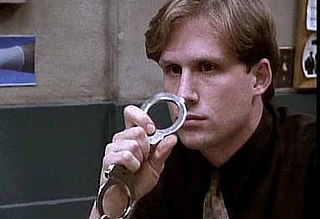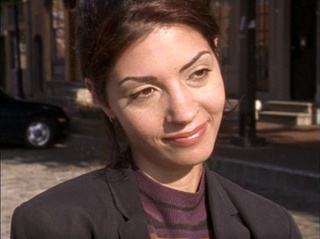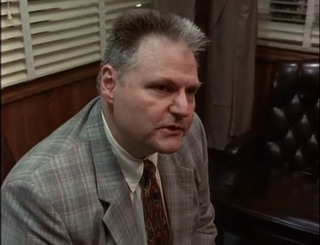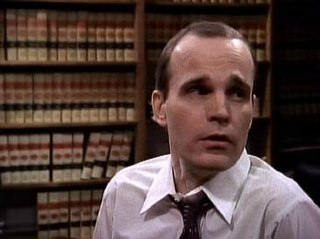Related Research Articles
Homicide: Life on the Street is an American police drama television series chronicling the work of a fictional version of the Baltimore Police Department's Homicide Unit. It ran for seven seasons and 122 episodes on NBC from January 31, 1993, to May 21, 1999, and was succeeded by Homicide: The Movie (2000), which served as the series finale. The series was created by Paul Attanasio and based on David Simon's book Homicide: A Year on the Killing Streets (1991). Many of the characters and stories used throughout the show were based on events depicted in the book.

Detective Michael Scott Kellerman is a fictional character on the television drama series Homicide: Life on the Street portrayed by Reed Diamond. He is a main character from seasons 4–6 (1995–98).

Det. Beauregard Donald 'Beau' Felton is a fictional character on the television drama series Homicide: Life on the Street portrayed by Daniel Baldwin for seasons 1-3. He was loosely based on Det. Donald Kincaid, from David Simon's nonfiction book, Homicide: A Year on the Killing Streets, on which the series was based.

Katherine "Kay" Howard is a fictional character in the American TV series Homicide: Life on the Street. She was played by actress Melissa Leo. In the first two seasons of the show her character was the only female detective or member of the main cast. However, NBC president Warren Littlefield felt that the lack of other female characters was alienating the audience, so Megan Russert was added to the show. It was stated in a special edition of Homicide: A Year on the Killing Streets, the non-fiction book that the film was based on, that the character of Kay Howard was based on Baltimore Police detective Rich Garvey. Howard is also influenced by Detective Bertina Silver, referred to as 'Bert' by her colleagues, thought by many in the unit to be the exception to the 'Secretaries-with-guns' female officer stereotype. The end result of the real-life influences was that Howard combined Garvey's superb and persistent work and sky-high clearance rate and Silver's complete acceptance by the male-dominated Homicide unit.

Meldrick Lewis is a fictional character on the television series Homicide: Life on the Street, played by Clark Johnson. The character is loosely based on Baltimore detective Donald Waltemeyer and appeared in the series for its entire run. Lewis had the very first and last lines of the series.

Terri Stivers is a fictional character in Homicide: Life on the Street. She was played by actress Toni Lewis.

Laura Ballard is a fictional character in Homicide: Life on the Street, played by Callie Thorne. She is a police detective in the homicide division of the Baltimore Police Department.

Roger Gaffney is a fictional police officer of the Baltimore Police Department on Homicide: Life on the Street. He was played by Walt MacPherson.

Stuart Gharty is a fictional character played by Peter Gerety in the television series Homicide: Life on the Street.

Ed Danvers is a fictional character played by Željko Ivanek in the television series Homicide: Life on the Street. For the TV finale movie, Ivanek was promoted to the main cast.

Rene Sheppard is a fictional character in Homicide: Life on the Street, played by Michael Michele.
"Blood Ties" is the three-episode sixth season premiere of the American police drama television series Homicide: Life on the Street. The episodes constitute the 78th, 79th and 80th overall episodes of the series. They originally aired on NBC on October 17, 24 and 31, 1997, respectively.
"And the Rockets' Dead Glare" is the seventh episode of the first season of the American police drama television series Homicide: Life on the Street. It originally aired on NBC in the United States on March 17, 1993. In the episode, Howard testifies in a murder trial, Pembleton is offered a promotion, and Lewis and Crosetti go to the Chinese Embassy in Washington, D.C. to investigate a political refugee's murder.
"Lines of Fire" is an episode of the seventh season of the American police drama television series Homicide: Life on the Street. It originally aired on NBC on May 7, 1999. The episode was written by James Yoshimura and directed by Kathryn Bigelow.
"Fallen Heroes" is a two-part episode that concludes the sixth season of the American police drama television series Homicide: Life on the Street. It comprises the 99th and 100th overall episodes of the series, and originally aired on NBC in the United States on May 1, 1998 and May 8, 1998.
"Finnegan's Wake" is the 21st episode of the sixth season of the American police drama television series Homicide: Life on the Street. It is the 98th overall episodes of the series, and originally aired on NBC in the United States on April 24, 1998.

Paul Falsone is a fictional character in Homicide: Life on the Street, portrayed by Jon Seda. He is a police detective of the Baltimore Police Department. Born on October 14, 1968, Falsone was introduced as a long-time member of the Auto Squad at the end of Season 5, where his natural talents proved useful in solving vehicle-related crimes. However, when the department began a rotation program, in which detectives would be periodically reassigned to new units, Falsone was transferred to the homicide shift commanded by Al Giardello. After three months, Giardello expressed satisfaction with Falsone's work and requested that he remain with the unit.
"Zen and the Art of Murder" is an episode of the seventh season of the American police drama television series Homicide: Life on the Street. It originally aired on NBC on April 2, 1999. The episode was written by Lloyd Rose and directed by Miguel Arteta. The episode is significant in the story arc of Laura Ballard's romance with Paul Falsone; fearful that their secret romance will be discovered, Falsone ends the relationship.
"Nearer My God to Thee" is the third season premiere of the American police drama television series Homicide: Life on the Street, and the fourteenth overall episode of the series. It originally aired on NBC in the United States on October 14, 1994. In the episode, the homicide department is assigned to the politically volatile murder of a beloved social worker, whose body is found wearing nothing but a pair of white gloves. Meanwhile, Felton struggles with marital problems, while Lewis and Munch try to find a business partner with whom to open a bar.